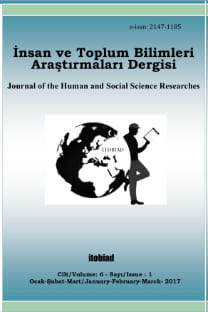Batıda oluşan ‘’Öteki‘’ Anlayışının İnançla Olan İlişkisi
Batı, Öteki, Kitab-ı Mukaddes, Yahudi, Hıristiyan
The Relationship Between the Concept of ‘the Other’, Which Originated in The West and Faith Abstract
West, Otherization, Bible, Jewish, Christian,
___
- Alıcı, Mustafa (2001). Kitab-ı Mukaddes ve Kur’an-ı Kerim Işığında İslam-Hristiyan Diyaloğu, Marmara Üniversitesi Sosyal Bilimler Enstitüsü, Basılmamış Doktora Tezi, İstanbul.
- Ali Rattansi (1997). ‘’Postmodern Bir Çerçevede ‘Batı’ Irkçılıkları, Etkinlikler ve Kimlikler’’, Irkçılık, Modernite ve Kimlik, (Haz. A. Rattansi & S. Westvood; Çev.: S. Akyüz) İstanbul: Sarmal Yayınları.
- Arıarajah, Wesley (1985). The Bible and People of other Faiths, Geneva.Bartolome, de Las Casas (1999). Kızılderililer nasıl Yok Edildi, (çev.: M. Ural), İstanbul: Şule yayınları.
- Cesaire, Aime (2005). ‘’Fransız Irkçılığının Fikri Temelleri’’, Sömürgecilik Üzerine Söylev, (çev.: G. Ayas) İstanbul: Doğu Kütüphanesi Yay.; Glover, T. R. The Jesus of History, Edinburg.
- Göregen, Mustafa (2014). Müslüman Yahudi Polemikleri, İstanbul: Hikmetevi Yayınları.
- Howe, Reuel L. (1969). The Miracle of Dialogue, Edinburg.
- Kılgallen, John J. (1994). ‘’Acts 17-31; an Example of Interreligious Dialogue’’, Studia Missionalia,
- Kitab-ı Mukaddes (1993). Kitab-ı Mukaddes Şirketi, İstanbul.
- Newbigin, Leslie (1981). ‘’The Gospel Among the Religions’’, Faits Meets Faits, ed. Gerald H. Anderson & Thomas, F. Stransky, New York.
- Said, Edward W. (2008). Şarkiyatçılık: Batının Şark Anlayışları, (Çev.: B. Ünler). İstanbul: Metis Yayınları.
- Sperber Daniel & Friedman F. H. (1978). ‘’Gentile’’ EJD, Jerusalem: VII, 410-414.Talmud Bavli (1984). (İbranice-İngilizce), Edt. Yehezkel (İzidor) Epstein, London.
- Vessels, Antonie (1993). ‘’Biblical Insights for Inter-Religious Encounters’’, The Bulletin of Christian İnstutes of Islamıc Studies, (January-June 1993), 22.
- Yılmaz, Mustafa Selim (2017). “Bir Terimin Arkeolojisi: Antisemitizmin Teolojik ve Politik Tarihi”, Cumhuriyet İlahiyat Dergisi, 21 (2), 1181-1216. Yiğitoğlu, Mustafa, (2012). “Sarcastic View of Islam in Western Christianity”, The Journalof Academic Social Science Studies, 5 (8), s. 1359-1369.
- Yiğitoğlu, Mustafa, (2017). “Negative Attitudes of Jews Regarding to Islam and Muslims Throughout the History”, Journal of History Culture and Art Research, 7 (2), s. 187-198.
- ISSN: 2147-1185
- Yayın Aralığı: 4
- Başlangıç: 2012
- Yayıncı: Mustafa SÜLEYMAN ÖZCAN
Türkiye'nin Savunma Sanayi Alanındaki Gelişiminin Türk Dış Politikasına Olan Etkisi
Osmanlı’dan Cumhuriyet’e Van’da Ve Sinop’ta Petrol Çalışmaları (1876-1950)
İngiltere’de Yerelleşme Politikaları ve Yerel Yönetimler
İçsel Markalaşma Faaliyetleri İle İç Müşterinin Markayı Benimsemesi
HİLAL UYGURTÜRK, Selva Seza CANDAN
Ameliyathanede Yangın, Alınacak Önlemler ve Çalışanların Farkındalığının Belirlenmesi
Ortaokullarda Bilgi Yönetiminin Gerçekleşme Düzeyleri
Sünnet Perspektifinden “Seküler Dindarlık” Üzerine Bazı Düşünceler
